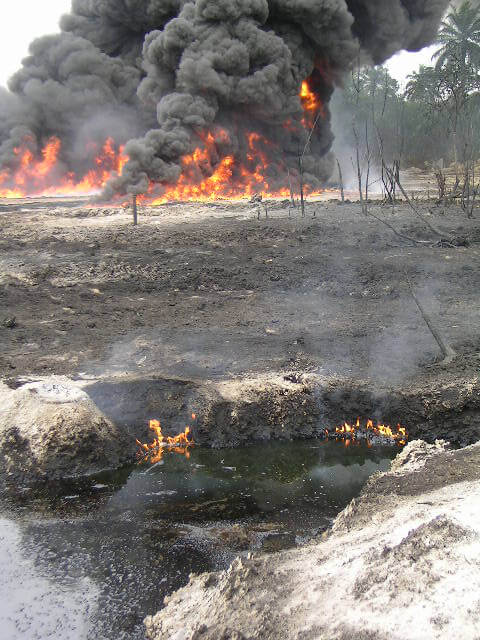 A new report by CRBM, Corner House and FoE Nigeria and others condemns oil majors Eni, Total and Shell for their record of environmental and social devastation in Nigeria. It also dissects EU ‘energy security’, arguing that a policy that locks the EU into dependence on fossil fuels leads to increased conflict and climate chaos.
A new report by CRBM, Corner House and FoE Nigeria and others condemns oil majors Eni, Total and Shell for their record of environmental and social devastation in Nigeria. It also dissects EU ‘energy security’, arguing that a policy that locks the EU into dependence on fossil fuels leads to increased conflict and climate chaos.
FOR IMMEDIATE RELEASE:
Eni misleads shareholders over end to gas flaring in Nigeria
Italian oil major Eni is misleading shareholders over the company’s commitment to end gas flaring in Nigeria, according to a new report [1] by an international delegation of non-governmental organisations (NGOs), following a recent fact finding mission to the Niger Delta. Gas flaring is illegal in Nigeria.
The report, entitled The reality behind EU ‘energy security’, examines the environmental and social devastation caused by European oil multinationals Eni, Total and Shell in Nigeria.
Internal documents obtained by the delegation reveal that Eni was warned in 2005 by its consultants that gas flaring has “adverse”, “long-term” and “irreversible” impacts on health and the environment.[2] Despite being aware of the ongoing dangers, Eni continues to flare gas. In May 2011, Paolo Scaroni, ENI’s chief executive assured shareholders during ENI AGM that the company planned to reduce flaring in its oil operation at Kwale to “zero” by June 2011[3] and the company has since stated: “We do not flare gas”[4]. However, the delegation documented ongoing flaring from at least five “flare stacks” at the Kwale processing plant [5]. Contrary to what ENI declares on its website [6], gas flaring is continuing also at Ebocha oil facility [7].
The delegation also documented the extensive damage caused by leaking oil pipelines and forced displacement. The community of Goi has been forced to abandon its land because of major recent oil spills in from 2004, 2008 and 2009, by Anglo-Dutch oil giant, Shell. In 2006, Total reportedly forced local residents in Egi off their land. Total’s divisive practices have increased inequality and fuelled conflict in Egi, leading to the deaths of two people and wounding of several others.
Affected communities are demanding that the companies should be held accountable, provide adequate compensation for the damage caused and restore the land. A local resident told the delegation: “We want our land back. Nothing good came out of petroleum exploration. Petroleum can’t give us food. We want the oil to remain in the ground”
“European companies are causing havoc in the Delta”, says Godwin Ojo, Director of Environmental Rights Action/Friends of the Earth Nigeria. “They operate double standards here, different from what obtains in Europe. They must be held accountable by home governments, law makers and judiciaries in their home countries such as Italy, France, UK and The Netherlands”.
“It is vital that UNEP’s emergency measures and recommendations for cleaning up the Delta and protecting human health are implemented”, say Nick Hildyard from The Corner House, one of the members of the delegation. “Environmental audits are needed in all the territories where oil exploration is taking place. The oil multinationals, their home states and the Nigerian government all bear heavy responsibility for the environmental devastation in the Niger Delta” [8]
The delegation also recommended a major rethink of the European Union’s so-called ‘energy security strategy’. “The EU is the world’s largest energy importer. Twenty per cent of the oil traded internally is coming from Nigeria”, said Elena Gerebizza. “Yet despite the clear imperative to keep fossil fuels in the ground if catastrophic climatic climate change is to be avoided, the European Union intends to rely on importing fossil fuels for decades to come. The EU’s ‘energy security’ policy is not only killing Nigerians: in the long term, it is jeopardising everyone. Priority must be given to a just transition away from fossil fuels.”
***
CONTACT:
Italy:
Campagna per la Riforma della Banca Mondiale, (CRBM), Elena Gerebizza, +39 3406705319, egerebizza@crbm.org
Nigeria:
Environmental Rights Action, Godwin Ojo, +2348135208465, [email protected]
UK:
Platform, Ben Amunwa, +44(0)7891454714, ben@platformlondon.org.
France:
Les Amis de la Terre, Ronack Monabay, +33(0)638898105, ronack.monabay@amisdelaterre.org
NOTES:
[1] The report is based on an international delegation fact-finding visit to Nigeria.
Organisations backing the report include: Campagna per la Riforma della Banca Mondiale (CRBM), Corner House, Environmental Rights Action/Friends of the Earth Nigeria, Les Amis de la Terre and Platform. https://bankwatch.org/sites/default/files/energy-security-nigeria.pdf
[2] Environmental Impact Assessment of Idu field further development project by NAOC, September 2005. http://www.crbm.org/EIA_IDU2005.pdf
[3] Response to Eni shareholder Osayande Omokaro, dated June 8th 2011.
http://www.crbm.org/ENI%20AGM%20answers%20to%20Omokaro%20June%202011.pdf
[4] Page 1 and 17, La Repubblica, L’onda nera che soffoca il Delta del Niger. 2nd October 2011.
[5] For photographic / video evidence, follow this http://www.crbm.org/Gas%20flaring%20at%20Kwale%20flowstation_September24th%202011.jpg
[6] “The Ebocha Early Gas Recovery project is part of a programme launched by the Nigerian Federal Government to exploit the obligations of international oil companies to supply gas for internal consumption. The completion of this project has resulted in the termination of gas flaring at the site thanks to the recovery and compression of associated gas (previously flared)”. http://www.eni.com/en_IT/eni–world/nigeria/local–development/local–development.shtml
[7] For photographic evidence, see the picture on the front page of the report.
[8] A recent survey by the United Nations Environment Programme documented widespread pollution from oil exploration in the Delta, with levels of cancer-causing byproducts over 900 times the tolerance levels set by the World Health Organisation. See http://postconflict.unep.ch/publications/OEA/UNEP_OEA.pdf